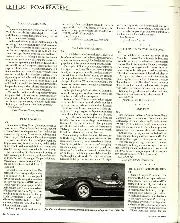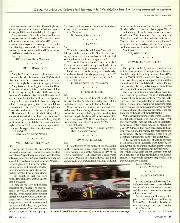

Letters from readers, December 1997
Clark and Chapman Sir, I enjoyed enormously October's article on Jim Clark. As it reveals, the relationship between Clark and Chapman was indeed extraordinary, but not without moments of tension.…
I was delighted to read the articles on Mike Hawthorn in the February 2019 of Motor Sport, but would take issue with your description of him as a ‘forgotten world champion’. Certainly his name may not be known to younger present-day spectators, but to septuagenarians such as myself he will never be forgotten.
When I get frustrated with modern Formula 1, I read again my treasured copies of Mike’s books Challenge Me the Race and Champion Year to remind myself of what hooked me
onto the sport in the first instance.
I only saw Hawthorn race once, at the 1958 British Grand Prix, when he came second to his ‘mon ami mate’ Peter Collins. My abiding memory of that July afternoon is Mike coming around on his slowing down lap, drinking a beer from a tankard that I believe was given to him by Tony Lanfranchi, who was marshalling at the event.
Wonderful days – Mike is sadly missed, but never forgotten.
David Robinson, Milton Keynes
What a star Mr Webb and his wonderful collection of Mike Hawthorn tributes is. It must be kept for the nation, surely? Our very first world champion!
Come on Lewis Hamilton! Stump up and help it happen. You are the best there is now, and a fine multiple world champion, modest and cool as a cucumber on track and a real credit to the sport.
PS: Cracking issue.
Nick Reece, Gwynedd
I have read with bemusement your recent articles bemoaning the current historic racing scene. It does not reflect what I see almost every day.
Of course things ain’t what they used to be. Nothing in life stands still – as a racer of mainly pre-war machines I’d be delighted to go back to the supposedly ‘gentlemanly’ racing when I started nearly 30 years ago. But as a race organiser I know full well that the thought of drivers not wanting to get one over on the regulations is laughable.
Yes, of course there are issues such as driving standards and over-developed cars. However, these can – and should – all be dealt with by the organisers responsible for the respective races, series or championships. Don’t criticise the drivers if the organisers let them get away with it.
And any organiser bemoaning diminished grids has simply failed to move with the changing demands of drivers, spectators and the circuits. Look at the extraordinary success of such as the Classic Sports Car Club to see how far off the mark some other clubs have found themselves.
But peer beyond club racing to the grids that populate the likes of the Donington Historic Festival, Silverstone Classic, Spa Six Hours and so on. You’ll find consistently well-supported grids, terrifically competitive racing and great atmosphere on and off the track, all organised by outfits who understand what their drivers want.
Undoubtedly the current historic racing scene is a far cry from the time when one simply turned one’s flat cap backwards and went racing, but today’s historic world is only reflecting the demands of those individuals who are most active in it. We should applaud this incredible movement and the amazing people in it.
Duncan Wiltshire, Chairman, Motor Racing Legends, Suffolk
I appreciated Doug Nye’s fair and accurate depiction of the changing face of historic motor sport. My good friend Tony Dron has been bringing this subject to the fore for many years. He and I spent some very happy years racing a 1961 Aston Martin DB4 in the Masters, ADAC Classic and Gentleman Drivers’ Races throughout Europe, with many class wins to our name. Classes were fair and scrutinising thorough.
In the 2007 Spa 6 Hours event, where endurance and maintaining a rhythmic lap average is the key, my car qualified in the 20s on the grid. This, I believe, was the first year that Ford GT40s were eligible and all seven qualified in the top 10. At the end of the race only one finished, seventh, two places behind our car.
Of the 12 or 14 GT40s suddenly now available, they invariably take all the prizes and fill the top 10 places. Hot-shoe drivers, but also improved mechanicals furnished by huge budgets from wealthy owners.
The grass roots of the sport have left or are leaving, as the gentleman driver no longer exists in their original form. Progress, maybe, but it requires a significant step-up in capacity checking and a verification through scrutineering that certain tolerances are adhered to and enforced.
We all love the show at Goodwood, but most recognise the sound of a well-known engine striking a new note never before heard. The power lies in the hands of the event organisers, for whom filling a grid has understandably taken preference in many instances.
Have we gone too far, or is it possible that a return to the truth is still possible?
Mark Taylor, via email
Your book extract about IMSA’s ‘bad boys’ (Motor Sport, January 9) reminded me of those heady days. I worked briefly for one IMSA owner/driver when he ventured into Europe in 1981, with his Porsche 935 K3. I never worked for him
in the USA, but the stories of drivers using drugs were legion.
My favourite concerned one of the racers mentioned in your piece. They would apparently spend practice diligently setting up their car and learning the track. Qualifying then consisted of a couple of warm-up laps, at a reasonable pace, but he would then need to pit and ‘take a rest’ in the truck or motorhome. After this ‘rest’ (usually only about five minutes) his pace stepped up markedly, as inhibitions and reactions were apparently on a different level. Each lap was quicker until, eventually, the car would not come around. It would be in the barrier or the sand, but usually on pole by a margin. Glory achieved, race day was usually quite calm, with the hard work often left to the hired pro.
Adam Going, Somerset
Fascinating to read the many articles extolling the virtues of using hydrogen as a fuel. The one in your December issue put the case most clearly.
While I agree with all being said technically, I have one nagging question. Why does no one discuss the safety aspect of highly inflammable hydrogen? What happens if a car is involved in an accident?
Are any proponents even aware of the R101 and Hindenburg airship disasters?
Eric Fletcher, Pretoria, South Africa
Contact us
Write to, Motor Sport, 18-20 Rosemont Road, London NW3 6NE or e-mail, [email protected]